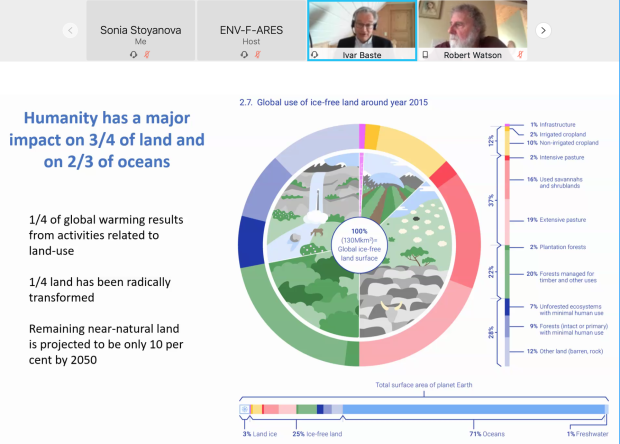Presentation of UNEP’s “Making Peace With Nature” Report to EU Officials
Discussion details
The EU and UNEP speak with one voice: “We need transformative change in order to effectively address the trio planetary crises.” Presentation of UNEP’s “Making Peace With Nature” Report to EU Officials
On April 16, the UN Environment Programme (UNEP) presented the Synthesis Assessment report “Making Peace With Nature: A scientific blueprint to tackle the climate, biodiversity and pollution emergencies” to the European Commission services and representatives from the European External Action Service (EEAS). The report which has been supported by the EU, is the first UNEP report to be launched by the UN Secretary-General in sixteen years. It argues that this decade is crucial for achieving sustainability and translates the current state of scientific knowledge into crisp, clear and digestible facts-based messages that the world can relate to and follow up on.

This presentation was vital for conveying the urgency of the planetary crises and stressing the importance of science as a tool for supporting evidence-based policies. The message conveyed by UNEP and EU speakers was clear “The current system is not sustainable, and we must decouple economic growth from environmental degradation”.
Astrid Schomaker, Director of Global Sustainable Development at DG Environment opened the discussion on behalf of the Commission saying the EU must lead by example. She followed by emphasizing the importance of the Synthesis report for realizing the ambitions of the EU Green Deal.
After Ms Schomaker’s intervention the floor was opened for the three scientists, authors of the Synthesis report “Making peace with nature”. Sir Bob Watson (lead scientific advisor), Ivar Baste (lead author) and Joyeeta Gupta, professor of environment and development in the global south at the University of Amsterdam and IHE Delft Institute for Water Education, presented the main findings of their research to the audience of a nearly hundred EU policymakers from European Commission services and the European External Action Service (including EU Delegations).

“We live in a world of three planetary crises: the pollution, climate and nature crises. They are all interconnected and must be addressed together. For example, the more one deforests, the more GHG would be emitted” stressed Ivar Baste.

Joyeeta Gupta highlighted that environmental risks are occurring with smaller temperature changes than previously estimated by scientists. Therefore, urgent action is not only essential but a prerequisite for preserving the human well-being.

Finally, Sir Rober Watson spoke about the urgent need to change our relationship with nature and bring transformative change at every level of our societies. He articulated the need for stronger commitments to climate neutrality. “If the current pledges under the Paris agreement are kept, in 20 years our emissions will be the same”, Watson concluded.
After the presentation the floor was opened for questions and EU diplomats, decision makers and scientists discussed policy solutions for mitigating the environmental emergencies and strengthening multilateral cooperation.

Over 90 people from the EU Commission’s cabinets, Directorates General (DGs), EEAS and EU delegations attended the presentation which was hosted by DG Environment. The Head of the UNEP Brussels Office, Veronika Hunt Šafránková, moderated the discussion. Dominic Porter, Head of Division for Economic and Global Issues from the European External Action Service closed the event and underlined the EU aimed to address the trio of planetary crises in a comprehensive manner and use science as an instrument to strengthen the international multilateral action to tackle the environmental emergencies outlined in the report.
Link to the Report: https://www.unep.org/resources/making-peace-nature
Log in with your EU Login account to post or comment on the platform.